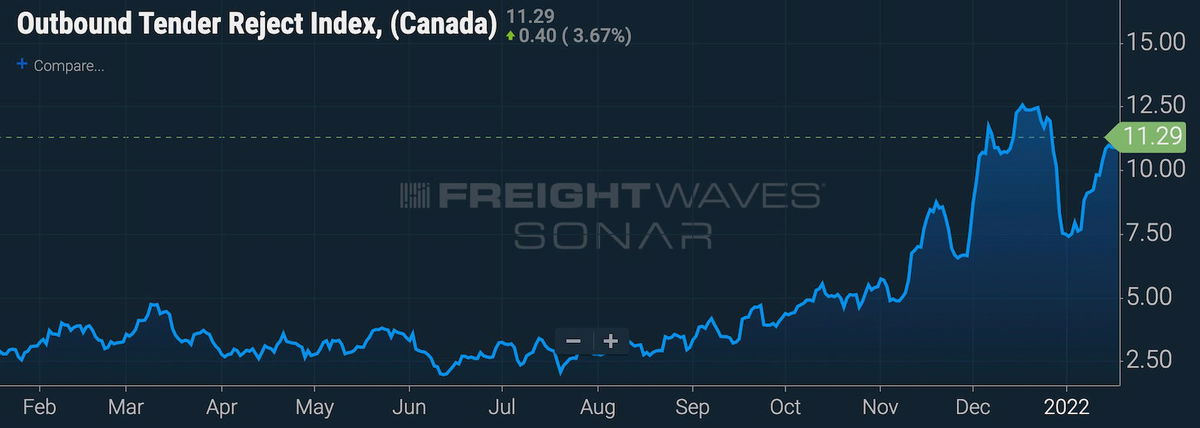Since Saturday, U.S. truckers who are unvaccinated or partially vaccinated against COVID-19 have been barred from crossing into Canada. A similar mandate is expected to hit Canadian drivers at the U.S. border next Saturday. Already, the mandates are being blamed for a jump in rates.
But cross-border freight pricing was already poised to increase significantly by necessity. Increasing demand for consumer goods and tight capacity have collided with higher costs and a scarce supply of drivers and equipment.
Spot rates in January across multiple U.S.-Canada lanes have been 10%-20% higher than a year ago, according to freight brokers. The big unknown: how many drivers will leave cross-border freight in response to the mandates and to what extent that will push rates higher.
“There’s going to be a new landing spot for pricing,” said Rob Piccioni, CEO of Fuel Transport, a Montreal brokerage and asset-based carrier.
“I don’t see us going back to CA$1.60 ($1.27) per mile pricing. It’s just not sustainable,” he added.
Piccioni does not agree with how the vaccine mandates are being rolled out. He worries that they are coming too soon for the supply chain to absorb the disruption and that they could help drive rates too high.
Nevertheless, the Canadian freight market — inextricably linked with cross-border operations — has been underpriced for a long time despite carriers having higher costs than in the U.S.
The NULOGX Canadian General Freight Index, which tracks costs paid by shippers, in its latest report found that base rates in October were 1.62% lower than a year earlier, though fuel surcharges have increased significantly.
During softer markets, cross-border spot rates have sometimes gotten unfathomably low — even under $1 per mile. The conditions have often been the worst for outbound freight from Canada to the U.S. During the early months of COVID-19, disruptions to trade balances created challenges for back hauls. At times, drivers could wait more than a day for a load back to Canada, or potentially go hundreds of miles for one. Savvier carriers and owner-operators sometimes returned to Canada without any freight rather than accept rates that could run below the cost to operate a truck.
Alain Bédard, the CEO of TFI International (NYSE:TFII), the largest trucking and logistics firm in Canada, has long complained about pricing on quarterly calls with financial analysts. In October, he took aim at the Canadian LTL market, saying it “runs at a discount versus the U.S. market in terms of quality of revenue.”
“There are too many clowns in Canada … too many clowns,” Bédard said, referring to LTL operators who don’t charge enough in his view.
Murray Mullen, CEO of Alberta-based Mullen Group (TSX:MTL), the second-largest publicly traded trucking company in Canada, addressed the issue more diplomatically.
“Prices must rise,” Mullen told analysts in October.
‘Insane’ pricing impact on produce coming
Canadian drivers move about 75% of the cross-border trucking capacity. As a result, it likely won’t be clear how much capacity gets lost as a result of vaccine mandates. The Canadian Trucking Alliance and American Trucking Associations project that 10% to 15% of drivers will leave cross-border freight instead of getting vaccinated.
Anecdotally, the picture appears very mixed across Canada. In Ontario and Quebec, some carriers report nearly 100% vaccination rates, especially in the Toronto and Montreal areas. But in more rural areas and other provinces, the impacts likely will be worse. Winnipeg, Manitoba-based Bison Transport has lost about 10% of its driver capacity because of the mandates, CEO Rob Penner told BNN Bloomberg on Monday.
Craig Germain, chief operating officer of Toronto area-based carrier and brokerage XTL Transport, expects fresh produce shippers to feel the capacity crunch and pricing increases more acutely as volumes ramp up in February and March. The reason: “You can’t wait a couple days for another truck.”
“Watch the impact of pricing on produce,” Germain said. “It’s going to be insane.”
Germain worries that pricing on the whole risks getting out of control and will contribute to mounting inflation in Canada. Beyond that, there’s the fluidity of the supply chain itself, which has already been tested by port congestion on the west coast, and the disruption to CN and Canadian Pacific rail service in December.
“Now with the vaccine mandates, you’ve got a lot of things that are not allowing for the flow we need in the supply chain,” he said.
Market ‘noise’ over mandates could fuel increases
For the moment, there isn’t concrete evidence that there’s been a massive exodus of drivers because of the mandates. The Outbound Tender Reject Index for Canada on FreightWaves’ SONAR platform shows that carriers are rejecting around 11% of tendered loads, not far from a one-year high seen in mid-December but about half the rate seen in the U.S.

While the data points to tightening capacity in Canada, the recent upward trend parallels a similar trend in the U.S.
Corey Darbyson, director of Transport Dsquare, a Montreal-based carrier with a cross-border brokerage division, takes the view that the mandates probably won’t have a huge impact on capacity, citing Canada’s high vaccination rate, which is approaching 90% for adults.
“I think it’s going to be negligible,” he said, adding that the bigger issue is rising fuel prices.
But he said the mandates could still drive prices up just because there’s a perception that it will happen.
“I anticipate it because the market is making that noise,” he said.
FreightWaves Market Analyst Zach Strickland contributed to this report.

